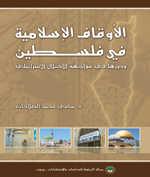Al-Zaytouna Centre for Studies and Consultations published a new book entitled The Islamic Endowments in Palestine and Their Role in Facing the Israeli Occupation, by Dr. Sami M. al-Salahat, the researcher specialized in endowment affairs.
The book is of 230 pages and it addresses the Islamic endowments in Palestine and how they formed an economic, social and humanitarian support for the Palestinians. It also shows how they served the Palestinian national movement especially during the British occupation of Palestine and were consequently targeted by the Zionist movement and by Israel.
On another hand, the book presents the mechanisms through which Israel targeted the Islamic endowments of Palestine in 1948 and 1967. It shows how military laws and decisions, such as the Absentee Property Law, were tailored to seize endowments and expropriate them for the benefit of the Israelis.
The book explains that the Israelis relied on a series of policies and strategic objectives to eliminate the Islamic endowments besides the above mentioned laws and decisions. These policies included for example mass destruction of Arab villages that included a lot of endowment properties. These properties were also either seized by force or bought by fraud. On another level, the book points out that the attacks on al-Aqsa Mosque and Jerusalem formed a clear model for eliminating Islamic endowments. These attacks include digging under the Mosque, flagrant violation of properties of religious value, confiscation of endowments such as the Moroccan Quarter and the continued Judaization of the city’s culture and heritage.
The book also calls for working on the development of operational plans and strategies to activate the endowment projects. These projects must focus on development and services such as education and health, especially that the Palestinians are in dire need for them.
Finally, the book urges highlighting the Israeli threats and dangers facing Jerusalem’s endowments and presenting them in international fora and different media outlets.
Al-Zaytouna Centre for Studies and Consultations, Beirut, 2/7/2011




Leave A Comment